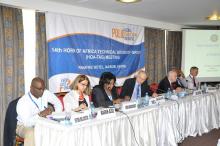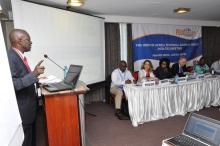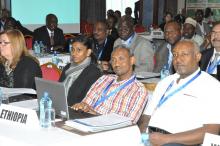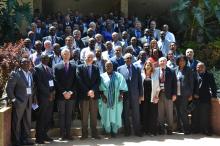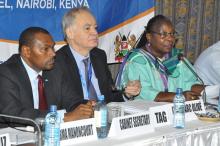The Horn of Africa Technical Advisory Group Meeting: “Pay Closer Attention to Surveillance and Immunity Gaps”
Nairobi, February 18, 2016 - The Horn of Africa Technical Advisory Group (TAG) meeting in Nairobi has ended with a declaration of a successful interruption and closure of the Wild Polio Virus (WPV) outbreak in the region.
But the meeting also made a cautionary call for the countries to pay closer attention to surveillance and immunity gaps that can make the region susceptible to possible importation of WPV from the endemic countries. The region has been free of WPV for the last 18 months but the TAG noted the circulating vaccine-derived Polio Virus (cVDPV) outbreak in South Sudan was yet to be closed and assessment would be done next Month.
The meeting noted that the region was still vulnerable to the WPV1 and VDPV due to certain conditions. These include: conflict conditions in Somalia, South Sudan and Yemen which have made accessing 1:25 million children difficult. Somalia has 400,000 to 430,000 who are inaccessible during supplementary polio campaigns and 235,000 others who have never been accessed since 2013. In South Sudan: 0.4 million children in three states (Unity, Upper Nile and Jonglei) are inaccessible while in Sudan, 147,214 under five children in the south (Kordofan, West Kordofan) and 15,486 in Blue Nile are also inaccessible. Yemen has 315,698 that are yet to be reached.
The TAG meeting chaired by Dr Jean-Marc Olive brought together global partners who support polio activities and the eradication agenda and country representatives from all the 10 countries of the HOA region. The countries are: Somalia, Djibouti, Eritrea, Ethiopia, Uganda, South Sudan, Sudan, Tanzania, Yemen and Kenya, The partners include WHO, UNICEF, CDC, USAID, Core Croup, American Red Cross and others.
Commending the efforts made by the countries to reach a closure of the WPV outbreak from 2013, Dr Olive said: “The job is not done and we need the highest level of immunity and surveillance to avoid any importation.” He said movement from the endemic countries (Afghanistan and Pakistan) to the rest of the region could easily become a source of importation of the virus.
The three-day meeting was also addressed by Dr Custodia Mandlhate, WHO Kenya Country Representative, who thanked the TAG for steering the Polio response assessment with commitment and seriousness. She urged the countries to keep an eye on surveillance and routine immunization to ensure no importation of the WPV happened. She also commended the Global Eradication Initiative (GPEI and governments for sustaining efforts to eradicate polio adding that there was great need for surveillance sensitivity to detect any new outbreaks and improvement of population immunity.
The Health CS Dr Cleopa Mailu in his remarks urged for the countries to overcome huddles and risks to polio eradication in order to achieve the 2013-2018 vision for eradication. He also called them to mobilize funds from the government and partners so that the efforts to sustain the eradication agenda are sustained. His remarks were read by Dr Joseph Sitienei, head of the division of Malaria and TB. The meeting made recommendations including:
- Countries to fully implement their switch plan from tOPV to bOPV which for all countries in the region is scheduled for April 2016
- HOA coordination office to facilitate cross-border meetings and document outcomes for the next TAG;
- Countries to take specific steps to improve surveillance in areas with identified gaps, document such steps and report to the next TAG;
- Country legacy plans to be developed in full collaboration with the MoH and partners by end of 2016
- Kenya to intensify advocacy with central authorities to ensure that momentum is regained, and issues of turnover of staff and funding are addressed. It should also strengthen surveillance (including community based surveillance) by implementing strategies targeting underperforming counties.
Participants also discussed the polio legacy and assets noting that most countries needed funding in order to sustain surveillance, Routine immunization and communication activities.
____________________________________________________
Communication Contact:
Dr Jemimah Mwakisha, Email: mwakishaj [at] who.int (mwakishaj[at]who[dot]int)
Technical Contact:
Dr Sam Okiror, Email: okirors [at] who.int (okirors[at]who[dot]int)




